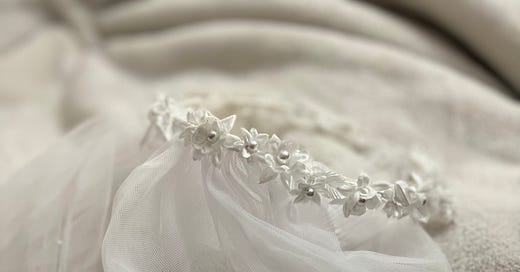My youngest, my fifth, will be having her First Holy Communion this weekend.
As I started to write this, I realized that I have not yet repaired the veil on my daughter’s headband. It is a hand-me-down but not from her older sisters who had simple chapel veils. At the last minute, I asked around to see if any of my neighbors had any fancy accessories for the occasion, and we were able to get things she loved: a flowered and pearled headpiece and sparkling shoes with a bit of heel.
I decided to spend money on a new dress because I knew that her older sister's style was not hers. While the older one wanted a smooth white damask dress with little adornment, the younger one wanted a skirt with glitter tulle and jewels.
I have still have other tasks… baking, decorating, and all. I do not feel quite ready, but we will be some type of ready by Sunday.
I was looking for well-crafted poems about Holy Communion, and I found three beauties by Malcolm Guite. (The link has recordings of him reciting them.)
For those who don’t know, Malcolm Guite is probably one of the most fascinating people around. He is an English poet and Anglican priest. He is a formalist who favors sonnets. When he isn’t busy being a writer, academic, or presbyter, he fronts a blues/rock band called Mystery Train as a singer and guitarist.
And do me a favor… please watch a video from his YouTube channel and confirm for me that he is indeed some cross between a hobbit and St. Nick.
Getting back to the poetry…
Of the three pieces on his website, Love’s Choice, Hide and Seek, and This Table, I found the second one, Hide and Seek, poignant when thinking about my daughter receiving for the first time. I have spent many years playing hide and seek with my kids, and now I find myself in the last days of pretending to be scared witless when a little one jumps out of her hiding spot.
Guite begins, “Ready or not, you tell me, here I come!” using the childhood game as a way of saying that God finds us no matter what—and we, likewise, find Him.
I know you, I reach you through your hiding-places too; Touching the slender thread, but now I see– Even in darkness I can see you shine, Risen in bread, and revelling in wine.
One of the other poems, Love’s Choice, examines how God has chosen for us to know Him.
This bread is light, dissolving, almost air, A little visitation on my tongue, A wafer-thin sensation, hardly there. This taste of wine is brief in flavour, flung A moment to the palate’s roof and fled, Even its aftertaste a memory.
This (and really all) corporeal knowledge is so ephemeral, fleeting and soon relegated to memory. The speaker in the sonnet ends saying that God “Chooses instead to seep into each sense,/To dye himself into experience.”
So often we see our bodies as burdens, especially as we age. We experience pain and injury. We look in the mirror and see something wrong or imperfect. The culture makes money off of our insecurities, making us believe we need a product to make us better versions of what we are.
But our bodies are the cradles for our lives and our souls. They are great gifts through which we experience the world and our relationships with others. We smell the air around us after a spring rain. We listen to conversations. We taste food made by someone who loves us. We hold and comfort a hurting child. We watch days break and suns set—marking time through beauty. We are given proof of life through all our senses.
What a gift! Each day—the experience of each day—is like our daily bread, a type of communion with the world.
And ready or not… here we come.





May God bless your daughter!
Lovely.. lovely!
Our bodies are the means by which we experience everything. They are strong, capable of much. They are frail, needing tending. We are soul and body, which is why our Lord comes to us in the substance of bread and wine, so body and soul can both experience him.